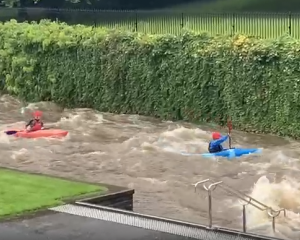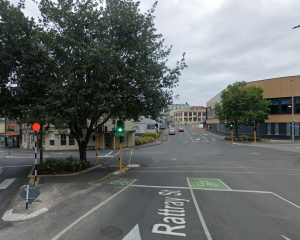
Claremont St residents say trees lining the street have been trimmed much more than usual and have subsequently been "butchered" by council contractors.
The council says the trees have been pruned using pollarding, a method that will make them more efficient to manage in future.
The Otago Daily Times was contacted by several residents on the street in Maori Hill who were unhappy about the pruning.
Warwick Johnson said he was leaving his home for a walk just over a week ago when he heard the sound of a wood chipper.
"The first we became aware of it was the loud crunching sound of the chipping machines.
"My wife and I stood and watched horrified as the trees got smaller and smaller and thought we need to find out what exactly the council were doing."
Within two or three days one side of the street had been extensively pruned, and one tree had been completely felled, Mr Johnson said.
"Every couple of years they are trimmed because there are power lines above them.
"I understand the necessity of it but this time around there’s been much more than normal . . . I do wonder what an experienced arborist would say.
"It’s one of the features of the streets; the trees lining it are what makes it one of Dunedin’s nicest . . . [the pruning] demonstrates a less than careful stewardship of city assets."
He contacted the council several times to ask why they had been pruned so heavily but had not received a response.
A Dunedin City Council spokeswoman said the trees had been pruned using a method known as pollarding.
"This is a common form of pruning and in this case the trees have been cut back to their original, first pollard point (called a knuckle).
"The height these trees have been pruned to will make them more efficient to manage in the future, which will lead to operational cost savings over time, but will also ensure they do not encroach on the overhead powerlines."
The council was intending to maintain an annual pruning schedule with the trees in the future, she said, the priority being the trees located underneath powerlines.
"Where possible, we will allow trees not at risk of interfering with electrical infrastructure to grow more naturally."
Comments
"The height these trees have been pruned to will make them more efficient to manage in the future, which will lead to operational cost savings over time", don't tell me that the "council" are finally thinking about saving money, got to pay for the near billion dollar debt somehow I guess.
It’s not “pruning” when they are taken back to ground level!
Might be better for long term cost effectiveness to put the cables underground! Greener leafier suburbs, absorbing more carbon without destroying the homes of nesting birds and their fledglings.
Spoken like someone who had no idea of the costs, or of horticulture even.
You can't just put lines underground, what about the lines to your house? Are you willing to pay for that yourself?
Of course you can put lines underground. With all new houses built the lines are underground. It is not a problem at all and while there are of course initially higher costs associated with this you don't need to replace poles and prune back trees. Also, you reduce storm damage etc. and it looks so much nicer than these ugly spaghetti everywhere. Of course if there is something wrong with the lines it is more involved to find the problem and you have to dig the lines up to fix it. I am sure most house owners at least in the more expensive areas of Dunedin would be happy to contribute to the costs. I certainly would. It always cracks me up when people say things that are absolutely common standard since decades in Europe are not possible here. Why are we always willing to accept third world standards here?
It's true, I'd don't know which is why I wrote MIGHT. I don't even know the road where the trees are! My comment was meant as a casual observation that there MIGHT be an alternative to the annual pruning and the disadvantages that creates. You appear to be an expert. Why don't you enlighten me on horticulture and the cost? Or just simply state that you are an expert and unfortunately in this case it is not practical or possible. What I do know however is the benefits of living in a healthy environment that supports a great variety of life.
Actually invercargill did this when I was growing up . Over 30 years ago ish .Various depts got together and when one was doing an section they would let the others know . They would share the excavation costs etc . Each do their bit while the trench was open . The city has never regretted it as a nice side effect it looks far better and cleaner without the poles and wires everywhere . Yes initial cost are a little higher but the long term savings alone are more than worth it .
So, if I understand correctly, Mr Johnson has no clue what an experienced arborist would say, but nonetheless his uninformed view that the Council is wrong is worth reporting? Why did the ODT itself not get the views of an arborist?












